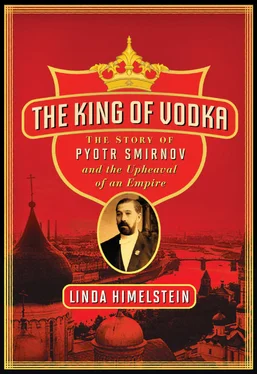Tolstoy had been a world-class carouser as a young man, despite his somewhat awkward and reserved nature. He spent much of his early adulthood living in the heart of a war that made no sense to him. He hid his misgivings under a mountain of cigarettes, loose women, and gambling binges. Never an ardent tippler, Tolstoy nonetheless found that moderate imbibing enabled him to slip into situations he otherwise would have never dared to enter. After a religious crisis following the great success of Anna Karenina, Tolstoy admitted, with horror, to his transgressions in Confessions, a moralistic tome that first appeared in 1879. “I killed people in war; summoned others to duels in order to kill them, gambled at cards; I devoured the fruits of the peasants’ labor and punished them; I fornicated and practiced deceit. Lying, thieving, promiscuity of all kinds, drunkenness, violence, murder—there was not a crime I did not commit.” 13
Now Tolstoy devoted himself to evangelizing abstinence. His reputation enabled him to reach vast numbers of people. For the next three decades, he wrote regularly about the perils of drinking, which he considered the root of all evil. In an 1886 comedic play titled The First Distiller , for instance, Tolstoy invented his own vodka concoction. The ingredients: blood of a fox, a wolf, and a pig. He also founded a publishing house to disseminate moralistic literature, and he enlisted his friend, noted artist Ilya Repin, to illustrate some of his writings. In 1887, he founded the Union Against Drunkenness, a grassroots temperance society.
Early one morning that year, Tolstoy called the people in his village of Yasnaya Polyana together. A table and bench were placed before the communal house near his estate. Tolstoy reached into his pocket, pulled out a piece of paper, and placed it on the table next to a bottle of ink and a pen. He then spoke passionately about the curses of tobacco and vodka. He entreated every man to sign the paper, a pledge to drink no more. Once they did, many at the urgings of their wives and children, Tolstoy asked them to dig a ditch. It was quickly filled with cigarettes, cigars, jars of tobacco, pipes, and cigar cases. 14
Smirnov was undoubtedly aware of Tolstoy’s high-profile campaign, and he probably resented his life’s work being characterized as amoral or anti-Christian. After all, Smirnov saw himself quite the opposite. He rose from modest means to become a respected business leader, the proud patriarch of an empire that provided jobs to five thousand Russians and funneled millions of rubles to the tsar’s treasury. 15What’s more, Smirnov believed he had turned vodka making into a kind of art form. He cared deeply about the quality and purity of his pristine formulas, and he claimed that his ingredients were the best, his vodkas the finest.
Ultimately, though, vodka itself was blamed. Tsar Aleksander III could no longer ignore the problem of alcoholism in his country. In 1895, three years before Smirnov’s death, the tsar established the State Vodka Monopoly in order to control the amount, and ensure the quality, of alcohol sold to the public. After that, vodka could be sold only in state-run stores, crippling independent distillers like Smirnov. His company managed to remain profitable, switching much of its vodka operation to other products and spirits, such as wine and Cognac. But Smirnov’s output eventually shriveled to a fraction of what it had been before the monopoly. No longer did some two hundred horse-drawn lorries bring barrels of liquor from the railroad to Smirnov’s warehouses. No longer was Smirnov’s factory able to produce his most famous drink, Table Wine No. 21 (vodka), or an array of his other original recipes.
As the signs of a more treacherous business environment rose, his health grew precarious, too. Smirnov began to plan for death. His goal was to craft an uncontestable will. He wanted no ambiguity about his desire. Smirnov had reason for concern. He had had three wives in his lifetime, only one of whom was still living, and ten surviving children. His family had managed to function much like a wheel. Smirnov served as the central hub, keeping the spokes connected—but at a reasonable, workable distance. Like so many others born into privilege, some of Smirnov’s children were cavalier about work, responsibility, or morality. Two of his sons, Nikolay and Vladimir, were notorious playboys. They gambled to excess and spent money indifferently, to the delight of proprietors of Moscow’s toniest shops.
Smirnov’s eldest son, Pyotr, was more business minded. But his ideas for running the vodka empire may have differed greatly from those of his siblings or stepmother, Smirnov’s third wife, Mariya Nikolayevna Smirnova. A genteel beauty twenty-seven years younger than her husband, Mariya had less concern for the futures of Smirnov’s oldest sons, who were already grown. [2] Mariya’s age is calculated by church records at the time of her death. No birth records for her could be found.
She focused on Vladimir and her two youngest sons, Sergey and Aleksey, who were just thirteen and nine, respectively, when their father died. The family schisms likely worried Smirnov. He understood that without him to keep the assemblage intact, it could disintegrate, taking his legacy and cherished empire down with it.
In the days after Smirnov’s death and his funeral, it seemed that his fears were on their way to becoming reality. Fights were brewing over how to run the business, who should manage the company, and how Smirnov’s considerable assets would be disbursed. Smirnov’s five daughters took no part in the discussion since each of them was allotted a flat 30,000 rubles (nearly $400,000). The rest of the estate was to be divided equally between Mariya and the Smirnov boys. 16
Pyotr Arsenievich Smirnov was dead now. A calmness enveloped Moscow late that cold Wednesday in 1898. As the mourners scattered, more than one thousand of the poorest in attendance were treated to free dinners provided by the Smirnovs and their friends. It was a grand gesture, a civility that would too soon be replaced with jealousy, anger, resentment, and ultimately, chaos.
Carts hauling withered bodies bumped along the dirt roads. Arms dangled off the sides of the wooden flatbeds like overgrown weeds. Victims, young and old, rich and poor, lay like toppled dominos, one after another. As they passed, making their way from the villages, cities, and towns to the freshly stirred ground in the forested countryside, pedestrians watched anxiously, covering their faces with cloth. The stench was worse now that summer was in full swing. Cholera had come to Russia.
The disease first appeared in 1823, coming ashore in the southernmost regions of Russia. At first, it looked to be little more than an isolated disturbance. Cases were reported sporadically but no one, including Tsar Nikolay I, seemed alarmed. A few extra doctors were dispatched and data collected about those infected and those who died. Then…nothing. For six years, Russia remained cholera free. Not until the summer of 1830 did Russia’s government and population recognize they were on the brink of a nationwide calamity.
Sickness quickly permeated the whole of Russia, wearing it down like a shark devours its prey, one deadly tear at a time. Scores of citizens fell ill after drinking water contaminated with the cholera bacteria or by coming in contact with untreated sewage. They suffered from a variety of intestinal ailments and severe cramping, which often led to crippling dehydration, shock, and then death. The outbreak had returned in July to Astrakhan, an important waterside trading hub in southern Russia near the Caspian Sea. Within six weeks, nearly three thousand residents died, or about 8 percent of the city’s total population. 1A gathering terror settled within Russia’s borders as cholera made its way north, loosely tracking the path of the Volga River.
Читать дальше












